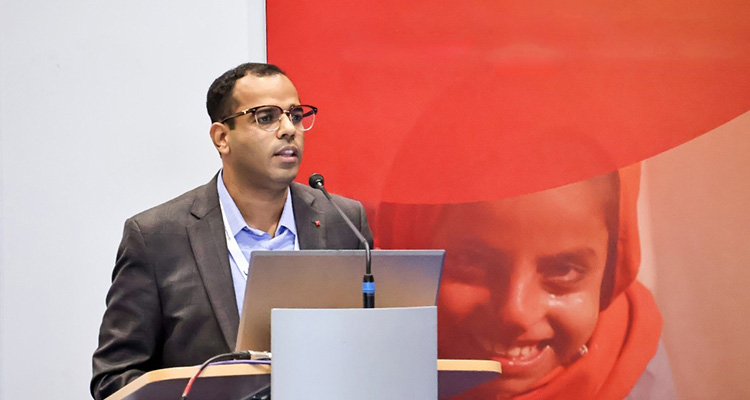Global Site
Breadcrumb navigation


Reshaping the sustainable agriculture landscape with Digital Technologies
How can emerging digital technologies like blockchain enhance the quality of everyday spices found in many homes? The NEC India Global Development and Delivery Center (GDC) is not only a powerhouse for NEC's global offshoring, it's also leapfrogging into technology initiatives and solutions that have the potential to impact NEC's SDG transformation journey. The Solution Factory division within GDC is pioneering key technology solutions to promote SDGs. Varun Malik is head of the Solution Factory, and part of his role involves applying cutting-edge technology to real-world issues.
Picking focus areas for maximum social impact
"Climate change, the participation of women in the economy, and healthcare and food for all are the biggest focus areas for me," Varun says. His team is working to identify the carbon footprints of various commercial activities and how digital technologies, such as crop management and energy management systems, can reduce these footprints while increasing agriculture yields. Digital solutions for disease surveillance, prediction, and vaccine supply chain management are the team's priorities for ensuring good healthcare services, especially for women and children.
Thoughts on working at NEC
NEC's Social Impact business has provided the opportunity for Malik to explore and test novel ideas, develop digital solutions that help solve social challenges, and serve as an ambassador for NEC's offerings to a global audience. Through these endeavors, NEC is actively contributing to the betterment of society, empowering lives, and laying the foundation for a brighter tomorrow.
"Social Impact works primarily with global organizations for SDGs and also on co-creation activities from NEC to the world's SDG goals," he says. "One of NEC's strengths is its digital capabilities and technologies. It's about using that to create a truly open, truly trusted world with the values of safety, security, fairness, efficiency, and sustainability."
Social Impact projects: the spice blockchain
Digital technologies are helping improve sustainability in developing countries in numerous ways. For instance, biometric identity management solutions are helping underprivileged children receive the subsidies they need. Digital technologies can also help reduce the carbon footprint of farms and even help farmers earn an estimated 20% more if their produce is traceable through blockchain, Malik notes.

As the world's biggest spice exporter, India ships more than $4 billion worth of spices such as chili and turmeric each year. Even though these are important export crops, there was a high rejection rate due to insufficient quality control. NEC worked with the international organization and Indian government agricultural authorities to launch a blockchain-based traceability program.
The team faced the challenges of collecting farmers' data, identifying and working with multiple stakeholders, defining processes and workflows, and training farmers and supply chain members to use the blockchain platform. For every product in the system, the farmer's identity, location, and quality testing details are included, along with information on growing conditions, child labor use, pesticides, and other factors.

"We tracked the entire value chain from farm to fork through the blockchain, ensuring data sanity and integrity, resulting in end-consumers getting traceability of spices," Malik says. "That increases the farmer's income because there is low risk to the value chain now and farmers can command better prices."
A proof-of-concept system involving about 3,000 farmers has been established, and stakeholders are now discussing putting it into production with about 100,000 farmers.
"Our learnings include a clear understanding of all stakeholders in the supply chain and effective communication to convince them to use the platform," says Varun. "Our recommendation to the Government of India is putting QR codes at two places for shipments so that even if one QR code gets damaged, the other one can be used."
Making projects sustainable
There are numerous other Social Impact projects that NEC is undertaking with government organizations or NGOs, including initiatives related to landmines, vaccines, refugees, and employment. After their launch with the initial investment, one of the most critical aspects of such projects is financial self-sustainability, says Malik. They can adopt methods such as transactional charges, for instance trading fees for participants in an online spice market, to ensure their long-term viability. Another important aspect of these projects is to track how they are impacting the lives of participants such as farmers, patients, women, or whoever the stakeholders may be.
"All the business outcomes and social outcomes have to be there for running such schemes over the long term," says Malik. "It's healthy for the organization providing the solution, the government, and ultimately the society."
Looking ahead
Malik is hopeful about the impact of technology in furthering the cause of environmentally sustainable economies.
"I'm highly optimistic about the future. I think 2024 is going to be the year where we can have more peace in the world and there's going to be a better, sustainable future. The adoption of green technology is increasing at a faster rate," says Malik. "Technologies are helping with the issues of global hunger and populations are stabilizing. The next 10 to 20 years will be very good for humanity as we go to the moon and explore deep space for new sources of energy and resources."
NEC professionals like Malik will continue to play a key role in harnessing the most promising, impactful technologies for the benefit of people everywhere. That's one way in which NEC is working to build a better world.
Varun Malik
Varun Malik joined NEC as a consultant about 15 years ago, working first in Noida, India and then in New York, USA where he was responsible for NEC's digital platforms solutions in the U.S. market and product management. He has a broad range of experience in business development related to emerging technologies such as generative artificial intelligence, neural networks, blockchain, digital twins, and metaverse. Currently based in India, he now works with the international organization and other nonprofit organizations as part of NEC's Social Impact business.

Contact Us